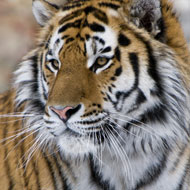Wild tigers to return to Kazakhstan

WWF plans to return wild tigers back to their historical range in the lli-Balkhash region.
Wild tigers will return to Kazakhstan almost a century after becoming extinct in the country, World Wildlife Fund (WWF) has confirmed.
The plan is to return the iconic cats back to their historical range in the lli-Balkhash region by restoring a huge area of forest that is part of the tiger’s historical range.
If all goes to plan, Kazakhstan will be the first country in Central Asia to implement such a paramount and large-scale program. To date, tiger relocation projects have only been successful within national borders and in areas that are already considered current tiger habitats.
On Friday (September 8), the Republic of Kazakhstan signed a memorandum with WWF to implement the joint tiger reintroduction plan.
Returning the tigers will be no mean feat. Working together, WWF and the government of Kazakhstan will tackle poaching and illegal activities, train and equip rangers, create thriving prey populations and engage local communities.
The reintroduction will play a part in the Tx2 initiative - a project to double the wild tiger population by 2022. Involving 123of the world’s tiger range countries, the initiative is described as ‘the most ambitious conservation effort ever attempted for a single species’.
In the last century, global wild tiger populations have fallen by 96 per cent, from 100,000 to as little as 3,890 in 2016. By the 1960s, wild tigers had completely disappeared from Central Asia due to habitat loss and uncontrolled hunting and poaching.



 The veterinary mental health charity Vetlife is inviting the veterinary community to join it for a sponsored cold-water dip.
The veterinary mental health charity Vetlife is inviting the veterinary community to join it for a sponsored cold-water dip.